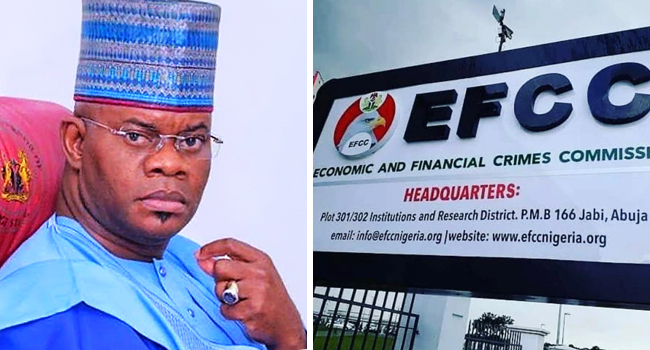The Supreme Court, on Friday, declined to declare the operations of the Economic and Financial Crimes Commission, EFCC, and two other anti-corruption agencies that were created by the Federal Government illegal.
In a unanimous decision, a seven-man panel of the apex court, led by Uwani Abba-Aji, dismissed the suit that 19 states filed to query the legal validity of the process that led to the establishment of the anti-graft agency in 2002.
According to the court, the EFCC Establishment Act did not require any form of ratification by the Houses of Assembly of the 36 states of the federation since it was not a treaty but a convention.
“A convention would have been ratified by member states, and the National Assembly can make laws from it, which will be binding on all the states in Nigeria as it is in the case of EFCC Establishment Act.
“In a country like Nigeria, the federating units do not have absolute power. The NFIU guideline is to present a benchmark and not to control the funds.
“Where an act of law is made by NASS like the NFIU and its guidelines, it is binding on all. Any act that has been competently enacted by the NASS cannot be said to be inconsistent.
“Where the NASS has enacted several laws on corruption, money laundering, etc., no state has the right to make law to compete with them. The investigative power of the EFCC cannot be said to be in conflict with legislative powers of the state assembly.
“I must agree with the AGF that the plaintiffs’ argument, that is, the Houses of Assembly of the plaintiffs’ states, is not tenable in law,” the Supreme Court added.
It will be recalled that the EFCC was established by an Act of the National Assembly on December 12, 2002, by the then administration of former President Olusegun Obasanjo.
Following the appointment and confirmation of its pioneer Executive Chairman, Mallam Nuhu Ribadu, and other administrative officers by the Senate, the Commission commenced its operational activities on April 13, 2003, though its Establishment Act was later amended in 2004.
However, in the suit before the apex court, the states, through their respective Attorneys General, argued that Section 12 of the 1999 Constitution, as amended, was not complied with before the EFCC began its operations.
According to the plaintiffs, it was a mandatory provision of the Constitution that the majority of the Houses of Assembly of States must vote and agree to the passage of the EFCC Act, insisting that it was not something that only the National Assembly was legally allowed to do.




